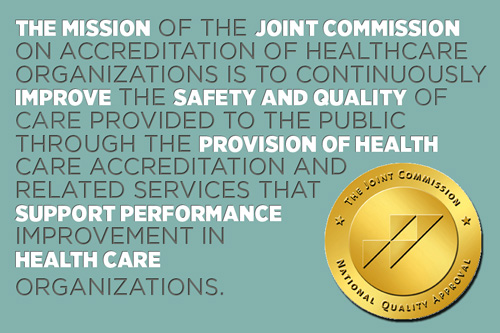HoursOpen 24 HoursCALL US(254) 897-2215
Quality Care
Since 1988, GRMC’s hospital and laboratory have earned and retained annual accreditation from The Joint Commission — an honor recognized nationwide as a symbol of quality.
TJC is an independent, not-for-profit organization that evaluates and accredits almost 19,000 health care organizations and programs in the United States. It is the nation’s predominant standards-setting and accrediting body in health care. Since 1951, the Joint Commission has developed state-of-the-art, professionally based standards and evaluated the compliance of health care organizations against these benchmarks.
Aiming to improve the safety and quality of care, The Joint Commission’s standards address an organization’s performance in key areas, focusing “not simply on what the organization has, but what it actually does,” according to TJC’s Web site.
“Standards set forth performance expectations for activities that affect the quality of patient care — if an organization does the right things and does them well, there is a strong likelihood that its patients will experience good outcomes,” says The Joint Commission.
To remain accredited, Glen Rose Medical Center must undergo an on-site survey by a Joint Commission survey team at least every three years. Our laboratory is surveyed every two years.
Patient Rights and Responsibilities
As a patient of Glen Rose Medical Center, you have the right to:
-
Receive considerate and respectful care;
-
Make decisions, in collaborations with your physician, involving health care;
-
Accept medical care or to refuse treatment after receiving clear information from your physicians;
-
Be informed of the medical consequences of refusing treatment;
-
Execute Advance Directives as permitted by law and have Glen Rose Medical Center staff and practitioners comply with their Advance Directives;
-
Provide informed consent prior to undergoing any non-emergency procedure;
-
Receive personal and informational privacy;
-
Expect any conversations about your hospitalization to be conducted discreetly;
-
Request a transfer to another room if another patient or visitor is unreasonably disturbing you;
-
Know the identity and professional status of healthcare workers and physicians providing services to them;
-
Have access to the information contained in your medical record as permitted by law and within a reasonable time frame;
-
Receive complete information from a physician concerning diagnosis, recommended treatment, and prognosis in understandable language;
-
Have special assistance for effective communication regarding medical care as needed;
-
Consult with a specialist at own request and expense;
-
Be informed of research, educational or experimental projects that affect care or treatment;
-
Receive satisfactory statement of charges, regardless of source of payment;
-
Have personal clothing and religious items that do not interfere with treatment of with the rights of others;
-
Receive services without discrimination of race, religion, sex, sexual orientation, age, culture, language, physical or mental disability, gender identity expression, national origin or source of payment;
-
Exercise cultural or spiritual beliefs that do not interfere with treatment or with the rights of others;
-
Prompt and orderly transfer to another facility when medically permissible and necessary;
-
Consult with members of the Hospital’s designated Ethics Consultation Team as needed;
-
Voice complaints regarding the quality of care received and have the complaint responded to;
-
Receive and send unopened mail;
-
To have a family member or representative of his/her own choice and his/her own physician notified promptly of his/her admission;
-
To receive care in a safe setting;
-
To be free of all form of abuse or harassment;
-
To the confidentiality of his/her clinical records;
-
To be free from restraints, of any form, that are not medically necessary or are used as a means of coercion, discipline, convenience or retaliation by staff;
-
To be free from restraints, of any form, imposed as a means of coercion, discipline, convenience or retaliation by staff;
-
To have unexpected or adverse outcomes explained to yourself and/or families by licensed independent practitioners or their designees;
-
The right to have their pain controlled;
-
Provide, to the best of your knowledge, accurate and complete information about your present complaint, past illnesses and other matters relating to your health care;
-
Report any unexpected changes in you condition;
-
Follow the treatment plan recommended by your physician, including instructions given by nurses and other healthcare workers;
-
Keep appointments or notify the physician or Hospital of your inability to do so;
-
For your actions if you refuse treatment or do not follow instructions;
-
Fulfill financial obligations for your healthcare;
-
Follow Hospital rules and regulations affecting care and conduct;
-
Be considerate of the rights of other patients and personnel;
-
Assist in the control of noise, smoking and number of visitors;
-
Be respectful of the property of others and the Hospital;
-
Have visitors of your choice or deny visitation to anyone.

© 2025 by Glen Rose Medical Center. All Rights Reserved. | Price Transparency | Site maintained by Flat Five Marketing.

